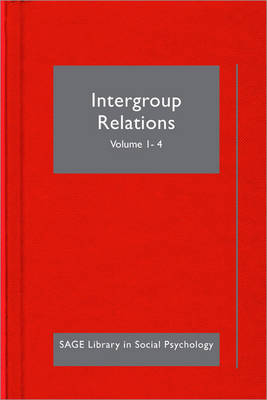
Stock image for illustration purposes only - book cover, edition or condition may vary.
Intergroup Relations
Richard J. Crisp
€ 1,100.10
FREE Delivery in Ireland
Description for Intergroup Relations
Hardback. This new, four-volume Major Work presents a comprehensive and authoritative collection of both classic and contemporary readings in intergroup relations. Each volume is opened by an introductory chapter which provides the reader with an overview of the primary topics covered therein, and the rationale behind the editor's selection. Series: Sage Library in Social Psychology. Num Pages: 1400 pages, illustrations (black and white). BIC Classification: JFFP. Category: (P) Professional & Vocational. Dimension: 234 x 156 x 97. Weight in Grams: 2631.
One of the most globally recognised sub-disciplines of social psychology is the field of intergroup relations, which has a strong relationship with both sociology and political science given its preponderance with themes such as prejudice, discrimination, multiculturalism and the relationship between social groups. This new four-volume major work presents a comprehensive and authoritative collection of both classic and contemporary readings in intergroup relations. Each volume is opened by an introductory chapter which provides the reader with an overview of the primary topics covered therein, and the rationale behind the editor's selection. Whilst the volumes are organized around the broad research themes of intergroup relations, the papers are carefully structured so that together they tell the story of how intergroup relations research has evolved within social psychology. Volume One: Cognitive Processes Volume Two: Motivation and Ideology Volume Three: Emotion, Neuroscience and Evolution Volume Four: Improving Intergroup Relations
Product Details
Publisher
SAGE Publications Ltd
Format
Hardback
Publication date
2014
Series
Sage Library in Social Psychology
Condition
New
Weight
2690g
Number of Pages
1400
Place of Publication
London, United Kingdom
ISBN
9781446274033
SKU
V9781446274033
Shipping Time
Usually ships in 4 to 8 working days
Ref
99-1
About Richard J. Crisp
Richard Crisp is a Professor of Psychology at the Aston Business School. He read Experimental Psychology at the University of Oxford and carried out his doctoral research at Cardiff University. In 1999 he took up his first lecturing position at the University of Birmingham, then in 2007 took up his first Chair in the Centre for the Study of Group Processes at the University of Kent. After a three-year term as Head of School, in 2012 he was appointed Chair in Psychology at the University of Sheffield. He moved to his current position at the Aston Business School in 2014. Richard's research has covered the full range of topics that comprise social psychology, from studies on the formation and reduction of prejudice, to the self and identity processes involved in interpersonal relations, from studies of mere exposure and attitude formation, to studies of social categorization. He has published this work in over 130 articles, chapters and books, including papers in American Psychologist, Psychological Science, Psychological Bulletin and Science. This work has been recognized with awards from scholarly societies including the British Psychological Society Social Psychology Mid-Career Prize and Spearman Medal. Together with Rhiannon Turner he received the 2011 Gordon Allport Intergroup Relations Prize from the Society for the Psychological Study of Social Issues (for the best paper of the year on intergroup relations). He is Editor-In-Chief of the Journal of Applied Social Psychology and former Deputy Chair of the British Psychological Society's Research Board. He is an Academician of the Academy of Social Sciences, Fellow of the Association for Psychological Science and Fellow of the British Psychological Society.
Reviews for Intergroup Relations
In this compendium of major works on Intergroup Relations, Richard J. Crisp, a leading social psychologist, expertly introduces classic and current papers that have theoretically and empirically contributed to the study of intergroup relations - focusing on cognitive processes, motivations, ideology, emotion, biology, evolution and the improvement of intergroup relations. This four-volume set will help readers enjoy the wonderful landscape of this area of social psychology.
Tomohiro Kumagai One of the key challenges to social psychologists is to understand, explain, and promote intergroup relations. This 4-volume compilation of 58 articles
both classic and contemporary
will enable graduate students and scholars to have an overview of the empirical and theoretical advances in the field. Professor Crisp has done a superb job of selecting the most appropriate pieces that accurately reflect how the field of intergroup relations has been growing since 1958.
Ramadhar Singh, Ph.D. (Purdue) This compendium of must read research papers in intergroup relations has been put together by one of the field's leading experts. It has been carefully organized into a series of integrative volumes and sections that address intergroup relations from a variety of distinct but complementary perspectives. This is an essential resource for students in the area.
Mark Rubin
Tomohiro Kumagai One of the key challenges to social psychologists is to understand, explain, and promote intergroup relations. This 4-volume compilation of 58 articles
both classic and contemporary
will enable graduate students and scholars to have an overview of the empirical and theoretical advances in the field. Professor Crisp has done a superb job of selecting the most appropriate pieces that accurately reflect how the field of intergroup relations has been growing since 1958.
Ramadhar Singh, Ph.D. (Purdue) This compendium of must read research papers in intergroup relations has been put together by one of the field's leading experts. It has been carefully organized into a series of integrative volumes and sections that address intergroup relations from a variety of distinct but complementary perspectives. This is an essential resource for students in the area.
Mark Rubin
